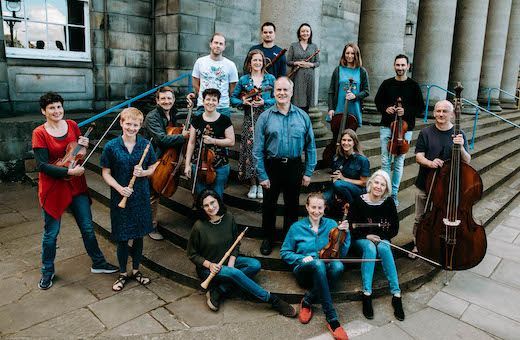Cannons was an opulent country mansion near Edgware, built by James Brydges, 1st Duke of Chandos, who packed it with old masters and briefly appointed one George Frideric Handel as resident house composer in 1717. Handel formed the Cannons Concert and, freed from the financial pressures of public performance, experimented with English texts and instrumental groupings. The creative embryonic work set the pattern for English oratorio but also produced the popular pastoral entertainment Acis and Galatea, whose early version was performed here in concert with authentic forces by the Dunedin Consort on the opening night of a short tour.

The simple nymphs and shepherds story is taken from Ovid’s Metamorphoses set in Sicilian arcadia. Sea-nymph Galatea is in love with the shepherd Acis, but the cyclops Polyphemus has his own designs on Galatea and hurls a Mount Etna boulder at Acis, killing him. In sorrow, Galatea laments but uses her divine power to immortalise Acis as a bubbling fountain. The tale, arguably thin on action, is musically rich in ideas with lively da capo arias and some memorable choruses providing a showcase for the singers.
John Butt directed his tight Baroque band of ten players with infectious dynamism from the harpsichord, taking the opening Sinfonia at a bracing lick. Outstanding stars of the piece, the pair of oboes, Frances Norbury and Oonagh Lee, established their central character to the entire work with thrilling playing, their breathtaking runs and ornamentation in perfect harmony painting the rural scenery. Matthew Truscott led the four violins with bright vigour, texture and depth coming from two cellos, bass and bassoon.
The Cannons version has just five singers making the choruses imbalanced with one soprano on the top line competing with three tenors and a bass, here taking a raucous approach to dancing and sporting the hours away in the carefree opening number. Rachel Redmond was a sweet voiced Galatea, pure and bright as she tried to hush Oonagh Lee’s birdlike sopranino recorder in “Hush, ye pretty warbling quire”. The constraint of the concert platform gives little room for acting but Nicholas Mulroy, off-score in his arias, brought characterful colour and perfect diction to Acis with a robust swing to “Where shall I seek they charming fair?”, his serenading of Galatea “Love in her eyes sits playing” a delight with sweet toned ornaments.
The first act is elegant and sensual, but the arrival of Polyphemus in Act 2, heralded by the giant forest-shaking footsteps in its opening chorus, brings high drama and an edgy melancholy. Christopher Purves had an immense amount of fun playing the opera’s rogue, loudly raging furioso and plumbing the depths with his giant pipe of a hundred reeds. “Ruddier than the cherry” was full of menace, the band capering along to the sopranino’s whistle with the mood darkening further when Galatea rejects his advances and love becomes “ever whining”, Purves turning dangerous in his rejection.
As Corydon, Nicholas Scott was a master of comic timing in his single aria, “Would you gain the tender creature?” in radiant voice as he tried to calm Polyphemus down. Completing the vocal group, Anthony Gregory as the shepherd Damon was elegant and stylish in his arias, moving as the continuo paused in his final “Consider, fond shepherd”. Finally, Redmond’s nuanced Galatea turned Acis into a fountain, two recorders burbling in accompaniment as the chorus urged her to dry her tears.
Handel’s patronage at Cannons was short-lived as the South Sea Bubble ruined Chandos. The contents of the house were sold and the building demolished, the Palladian pillars preserved to front the National Gallery. Acis and Galatea is a delightful work from that short creative time and everyone in the Dunedin Consort clearly enjoyed themselves. Those terrific oboes are still ringing round my head.


